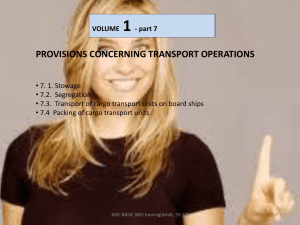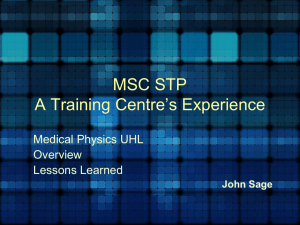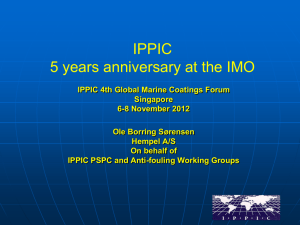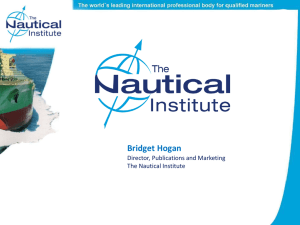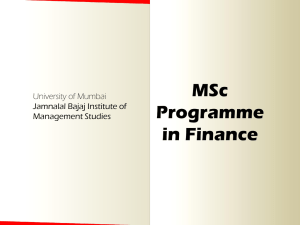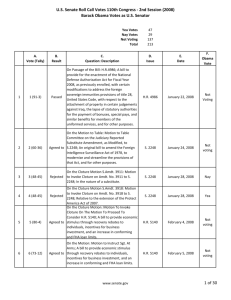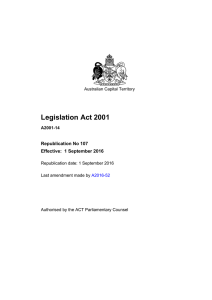Exercises - msc
advertisement
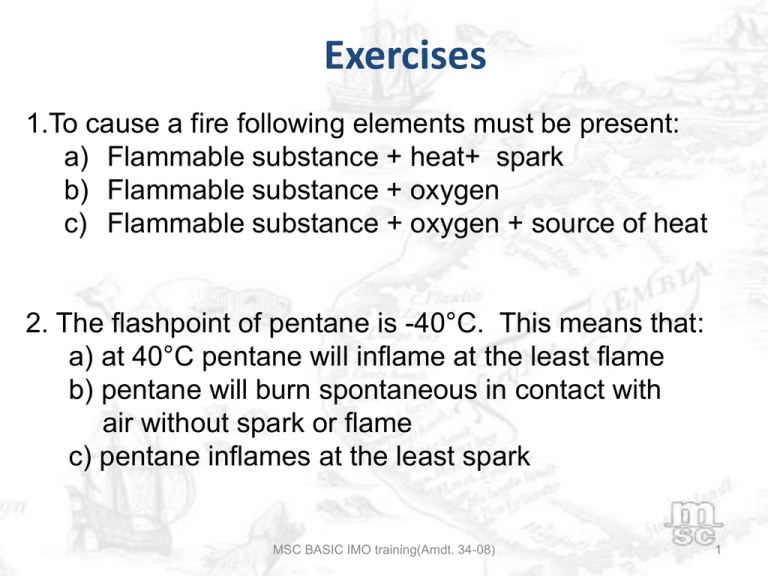
Exercises 1.To cause a fire following elements must be present: a) Flammable substance + heat+ spark b) Flammable substance + oxygen c) Flammable substance + oxygen + source of heat 2. The flashpoint of pentane is -40°C. This means that: a) at 40°C pentane will inflame at the least flame b) pentane will burn spontaneous in contact with air without spark or flame c) pentane inflames at the least spark MSC BASIC IMO training(Amdt. 34-08) 1 Exercises 1. Sulphuric acid is a corrosive fluid. This means that sulphuric acid: a. has a caustic effect on eyes and skin b. is very toxic when inhaled or swallowed c. can cause infections at contact with the skin 2. Calcium nitrate is an oxidizing solid. This matter: a. is flammable b. is not flammable but stimulates fire of other products c. reacts dangerous with water. MSC BASIC IMO training(Amdt. 34-08) 2 Structure IMDG-code The Dangerous Goods List can be found in: Volume 1 (“part 3”) Volume 2 (“part 3”) The supplement Volume 1 (“part 5”) Where can you find the classification of dangerous products? MSC BASIC IMO training(Amdt. 34-08) 3 Structure IMDG-code – All acids can be found in: • Volume 1 (part 2: CLASSIFICATION) • Volume 1 (part7: SEGREGATION) • The supplement • Volume 2 (chapter 3.1: SEGREGATION GROUPS) – Right or wrong? • Regulations transport documents: vol.1 part 5 • Dangerous labels: vol.1 part 5 MSC BASIC IMO training(Amdt. 34-08) 4 IMDG-code Packing group II stands for: ◦ ◦ ◦ ◦ Very dangerous Dangerous Less dangerous Indicates the sort of packing A “unit load” is could be: ◦ ◦ ◦ ◦ A packing including it’s content A tank container or a truck Inside packing inside a cardboard box A pallet on which several boxes are settled MSC BASIC IMO training(Amdt. 34-08) 5 IMDG-code The EmS of the IMDG-code signifies: 1/ Entire material Safety data sheets 2/ Emplacement Schedules for dangerous goods 3/ Emergency Response Procedures for Ships Carrying Dangerous Goods 4/ Emergency and Safety rules for dangerous products MSC BASIC IMO training(Amdt. 35-10) 6 DANGEROUS QUALITIES Is the following statement correct? Flash Point, °C: “the highest temperature (at normal air pressure) where a fluid deposits so much flammable fume (at or nearby the fluid surface) that this fume, intensive or mixed with air, can be inflamed by a hot surface.” MSC BASIC IMO training(Amdt. 35-10) 7 IMDG-code What is the Proper Shipping Name? • UN1037 • UN1263 • UN1935 • UN1955 • UN2786 MSC BASIC IMO training(Amdt. 35-10) 8 IMDG-code •What is FP for UN 1922, UN 2789? •What is the Packing Group (PG) for UN 2024? •What is the danger of “AZODICARBONAMIDE”? (UN3242) •Are CO (UN1016) and chloride (UN 1017) marine pollutant? MSC BASIC IMO training(Amdt. 35-10 ) 9 EXERCISES 1. Are the following products classes 3? a. LPG, butane, acetylene b. Camphor, matches, sulphur powder c. Acetone, ether, gasoline 2. What class are substances subject to selfheating or spontaneous combustion? a. 4.1 b. 4.2 c. 4.3 MSC BASIC IMO training(Amdt. 35-10) 10 EXERCISES 1. This label means: a. Toxic solid, liquid or gas b. Toxic and infectious substance c. Toxic solid or liquid 2. Nitrogen is a non toxic and non flammable gas. For sea transport gas cylinders must: a. Not be labelled b. Be labelled with a green label c. Be labelled with a red label “FLAMMABLE GAS” MSC BASIC IMO training(Amdt. 35-10) 11 UN2031 NITRIC ACID: packing provisions? UN 2014 IBC provisions? UN 2011 MAGNESIUM PHOSPHIDE: packing and IBC provisions? MSC BASIC IMO training(Amdt. 35-10) 12 1. Are the following materials transportable in bulk in containers? UN2067, UN2071, UN2073, UN2074 2. Are they transportable in IBC’s ? 3. In what type of bags can you transport UN3243? Are there special terms for it? 4. UN 1265: can this liquid be transported in plastic jerrycans with a content of 30 litres? MSC BASIC IMO training(Amdt. 35-10) 13 1. Box of matches UN1944 weight 4,5 kg: LQ=? 2. 7 boxes of matches UN 1944 (5kg per box) in one fibreboard box: LQ=? 3. Same question but with 6 boxes of matches 4. 3 boxes of matches UN 1944 (6kg per box) in one fibreboard box : LQ=? MSC BASIC IMO training(Amdt. 35-10) 14 EXERCISES 1. Are the following products classes 3? a. LPG, butane, acetylene b. Camphor, matches, sulphur powder c. Acetone, ether, gasoline 2. What class are substances subject to selfheating or spontaneous combustion? a. 4.1 b. 4.2 c. 4.3 MSC BASIC IMO training(Amdt. 35-10) 15
